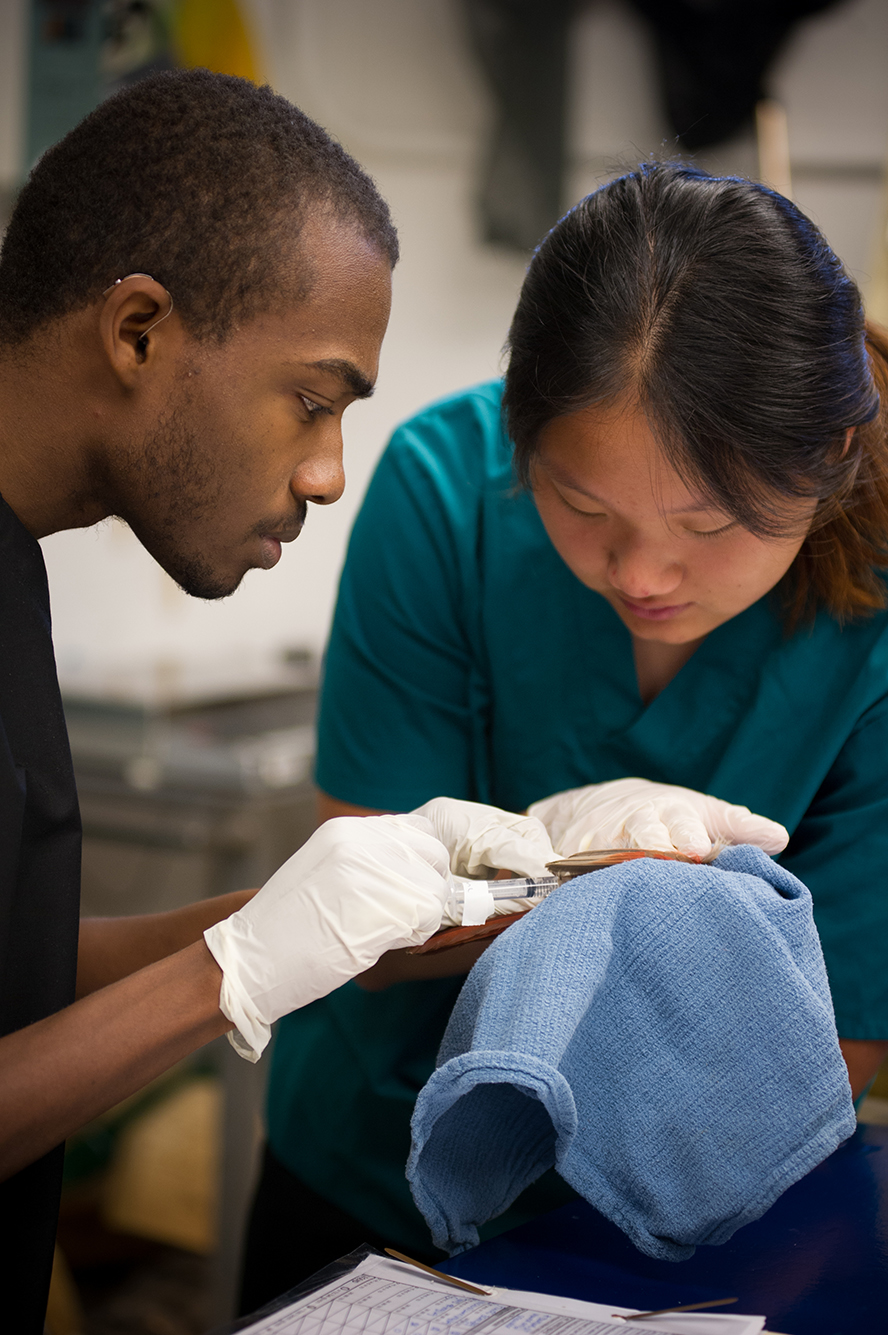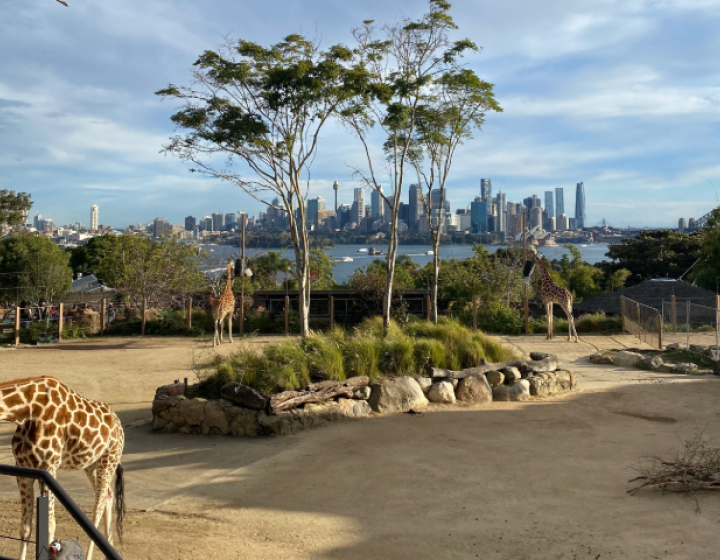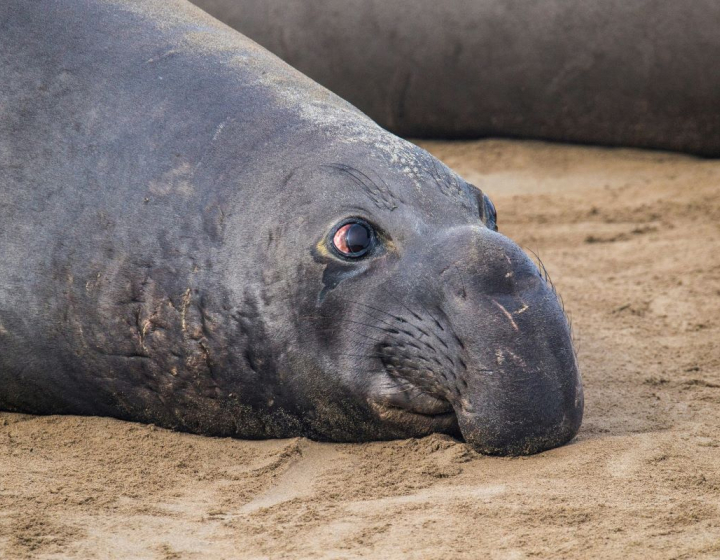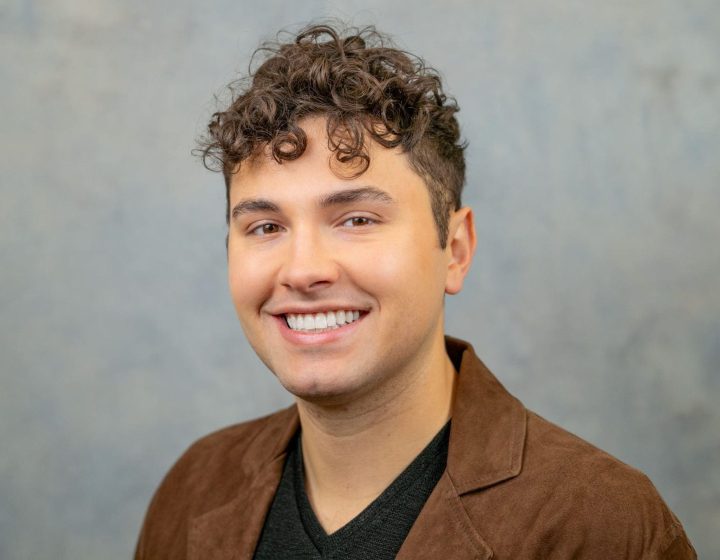Veterinary techs-in-training benefit from Cornell's unique caseload
Whether it’s managing a difficult labor and delivery, diagnosing and treating cancer or conducting a full-mouth tooth extraction, the Cornell University Hospital for Animals (CUHA) regularly treats conditions across all areas of veterinary medicine. This diverse caseload is what attracted Jenny Marion, now a licensed veterinary technician (LVT) with Cornell’s Exotics Service, to apply to Cornell’s Veterinary Technician Preceptorship in Small Animal Medicine.
“I only applied to Cornell for my preceptorship; I knew the veterinary hospital would provide a wealth of experience and exposure to the field in ways a general practice couldn’t,” explains Marion. “I didn’t realize how many different careers and options there were for LVTs. My preceptorship opened my eyes to how varied the day-to-day could be for technicians in different departments.”
 Preceptorships are an important and required component of a veterinary technician’s education. Before graduating and acquiring their license, LVT students must take part in a preceptorship or externship to put into action what they have learned in the classroom. This is usually after their first year of school. As part of Cornell’s intensive, unpaid preceptorship program, students go through two three-week rotations across different specialties in addition to primary care. These include medical and radiation oncology, ophthalmology and exotics, as well as a rotation with Maddie’s® Shelter Medicine Program. Depending on whether they are in a small animal or large animal preceptorship, students will also do rotations in either small animal surgery, small animal internal medicine, and small animal anesthesia, or large animal medicine, large animal surgery, and large animal anesthesia.
Preceptorships are an important and required component of a veterinary technician’s education. Before graduating and acquiring their license, LVT students must take part in a preceptorship or externship to put into action what they have learned in the classroom. This is usually after their first year of school. As part of Cornell’s intensive, unpaid preceptorship program, students go through two three-week rotations across different specialties in addition to primary care. These include medical and radiation oncology, ophthalmology and exotics, as well as a rotation with Maddie’s® Shelter Medicine Program. Depending on whether they are in a small animal or large animal preceptorship, students will also do rotations in either small animal surgery, small animal internal medicine, and small animal anesthesia, or large animal medicine, large animal surgery, and large animal anesthesia.
“CUHA regularly receives referrals from primary veterinary practitioners for advanced diagnostic services, treatments and surgeries. These are all opportunities for our preceptors to shadow and learn from LVTs performing at the top of their license,” explains Kalli Anderson-Dyer, LVT for the Dentistry and Oral Surgery Service and chair of the preceptorship program. “When they graduate, our preceptors have a better understanding of the type of work they want to do and a stronger resume to back that up.”
Because Cornell is an academic and research institution, preceptors not only shadow LVTs, but they also spend their day alongside veterinary students, residents and faculty. This exposes preceptors to a range of educational opportunities.
“Everyone here just loves to teach and did so naturally as we went through cases. They always included me in whatever hands-on opportunities and other training they were presenting the veterinary students,” says Marion. “I got to try things I hadn’t done in technical school.”
In addition to the diverse experience, preceptors find the connections they make to be invaluable. The connections Marion made during her preceptorship were great internal references when she applied–and was hired for — the intensive care unit immediately following graduation from technical school.
Mark Cummings, emergency and nursing care LVT at Cornell’s Equine and Nemo Farm Animal Hospital, participated in Cornell’s Veterinary Technician Preceptorship in Large Animal Medicine and also was hired by Cornell immediately following graduation. In fact, he never had to look for a job. “Before graduation, I was encouraged to apply by someone I met during my preceptorship and then went through a competitive interview process,” he says. “Ultimately, doing the preceptorship program, I believe, gave me an advantage over other applicants.”
“Cornell’s preceptorship program was attractive to me because it offered more professional development opportunities than others,” adds Cummings. “Students get to sit in on rounds, hear veterinary students talk about cases with clinicians and to present one of those cases to their fellow preceptors at the end of the program. This is not the type of experience you’d get working in a practice. Having a job just come to me was an unexpected benefit.”
Now a member of the Preceptor Committee, Marion notes this is one of the benefits of the program for Cornell. “We’re essentially training and interviewing potential future employees for seven weeks — and they’re getting to know more about career opportunities. It’s a win-win.”
Cornell is currently accepting applicants for the 2020 program, which runs from June 18 through Aug. 7. The deadline for applications to the small and large animal programs, as well as the Wildlife Medicine Preceptorship, is Feb. 21. More information is available online.
By Cynthia McVey





